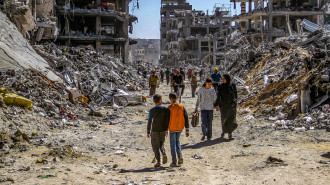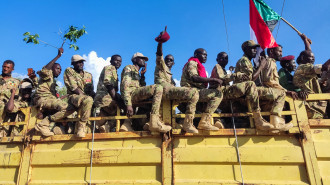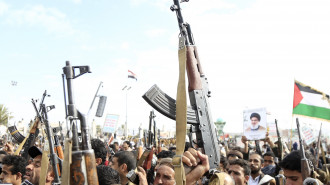The Algerian street where women are barred
The Algerian city of Constantine, known for its beautiful bridges and old markets is often referred to as the capital of Algeria's east.
The city attracts scores of Algerian and foreign visitors every year who visit the magnificent bridges or the specialty market streets tucked in the old city.
However, the city has a unique feature: Rahbat al-Jammal, a street at the heart of the old town that is possibly the only street in Algeria and perhaps even the Arab world where women are strictly forbidden from entering.
Rahbat al-Jammal was constructed during Ottoman rule in Algeria and contained various rest stops or khans that housed travellers and their horses and camels.
The New Arab visited the street to better understand the strange prohibition against women's entry and to see what locals thought of this unwritten rule.
As we walked towards the entrance of the street, we knew we had to bid farewell to the women who had accompanied us thus far from the city's nearby playhouse, while people watched intently to see whether the women would dare enter.
Upon entering the street, we asked a young bookseller what would have happened if our female companions had ventured into the street with us.
 |
When the French colonised Algeria in the first half of the nineteenth century, they turned Rahbat al-Jammal into a red light district where French soldiers would visit prostitutes. - Murad |
 |
"Is the city not big enough for those women for them to break traditions and enter al-Rahba?" said the bookseller after a momentary pause.
"The shops on this street exist in most streets and there's no reason to challenge traditions," added the young bookseller.
Many of the shops on the street have existed for a century. An old man named Murad runs one of those shops.
"I've been selling here for 45 years now. I grew up knowing that women are not allowed into the street," Murad told The New Arab.
"During those years, I've probably seen women enter only a handful of times".
Seedy history
We asked many people in Rahbat al-Jammal why women were not allowed and they all gave us the same answer that was repeated by Murad.
"When the French colonised Algeria in the first half of the nineteenth century, they turned Rahbat al-Jammal into a red light district where French soldiers would visit prostitutes," said Murad.
"An brothels were some of the only places where Algerians were allowed to mix with the French so the city's elders banned women from entering the street to due to its reputation," added the old shopkeeper.
The street's brothels continued to operate for two decades after Algeria's independence from the French in 1962, however the ban on women's entry to the street remained in place and became a social custom in Constantine.
Murad showed us the only passage through the area that women allowed to pass through to reach the residential neighbourhoods that surround Rahbat al-Jammal.
 |
Two years ago I entered the street with the help of my brother who rejects this custom. I dressed like a man and walked through without being noticed. It was a great experience. - Sabrina |
 |
Defiant locals
While there, The New Arab ran into Sabrina, a political sciences student at Constantine's main university who had walked through Rahbat al-Jammal a few years ago.
"I was always been curious about the street. I've walked through this passage since I was a little girl and I would always glimpse the street and smell the various aromas emanating from it," Sabrina told The New Arab.
"Two years ago I entered the street with the help of my brother who rejects this custom. I dressed like a man and walked through without being noticed. It was a great experience," she added.
Her brother Salih who sells men's shoes in Rahbat al-Jammal - where everything on sale is for men - interjected to say: "What's the point of continuing to ban women's entry when the original purpose no longer exists?"
"The brothels have been close for a long time and the street is like any other in the city. Our businesses have been affected by the lack of female customers," added Salih.
The city of Constantine was declared the Capital of Arab Culture 2015, and played host to intellectuals, writers and artists from across the Arab world who had mixed reactions upon hearing about the city's male-only street.
"Why is the street crowded with men if the reputation of its past lingers?" questioned Moroccan writer Adel Lutfi. "Wasn't that past created by women and men together?"
However, Kurdish poet Vinus Faiq believes that visitors should respect the city's customs without judgment.





 Follow the Middle East's top stories in English at The New Arab on Google News
Follow the Middle East's top stories in English at The New Arab on Google News


